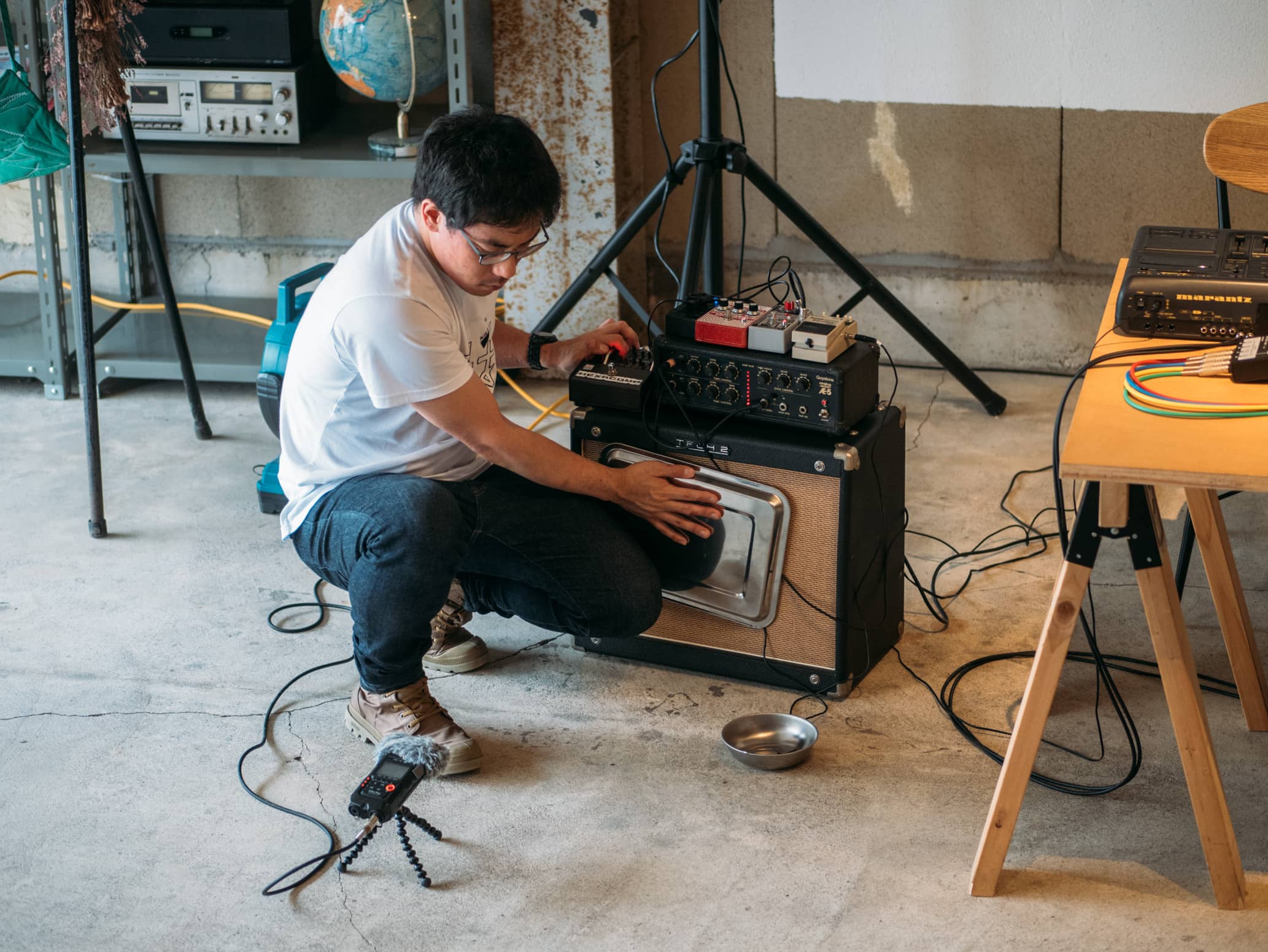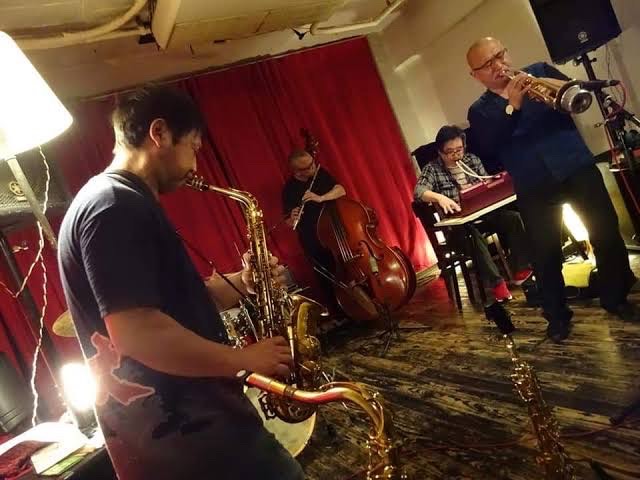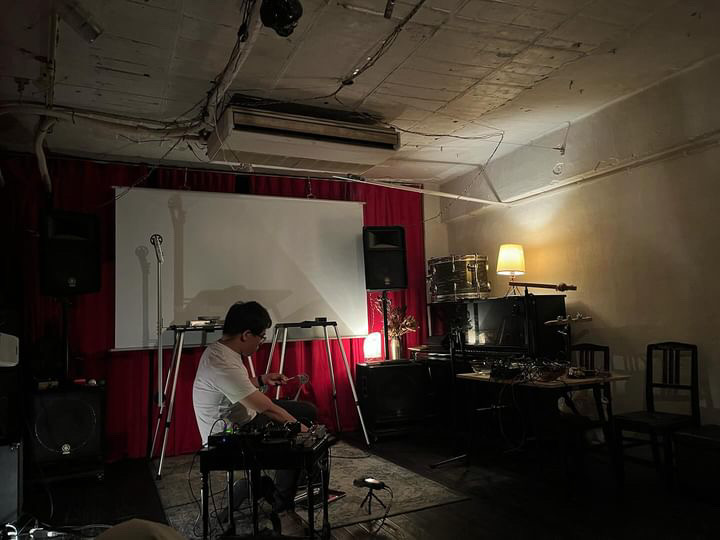Leo Okagawa Interview: Five questions and postscript
Date: October 2023
Question: Sun Yizhou
Answer: Leo Okagawa

1. The first day we met you bought a CD. The second time you played that damaged compact disc your purchased in the performance. Almost like you were led by chance, but went through it with both greatest patient and indifferences when you play. BTW I’ve heard later that it’s caused by the undried glue before sealing. However, the re-corded piece turned out to be one of our new releases. What happened to that disc after? Have you ever performed it a second time or try another disc?
Yes, I bought a CD. And I found it’s not playable when I put it into the player, sounding quite strangely. But I was really interested in the sounds, so I used it in my next performance. You can hear it in the beginning of ‘Nanahari’.
However, I don’t like to take the same way twice or more, so I’ve never done it again after then. Now that CD is somewhere in my room, but I don’t know where it is.
2. I read your interview on jazztokyo (https://jazztokyo.org/interviews/improviser/post-85908/). To get away from a life, you decided to go for a walk. Those walks took you to different fields. First, you started releasing field recordings under the name protocell. Then, The Glistening Examples released The Notional Terrain by Leo Okagawa, and later being asked by Suzuki San to do live performances at Ftarri, among many other. And later on, Zappak arrives. How do you experience and perceive the world now? Are things getting better between you two? Have you found many different worlds?
After graduating from university I started working in a company. But I got depressed soon. Unfortunately I still struggle for it now. I think it’s a wrong expression to say ‘get away from a life’ though, I needed to stop working and try to live with this mental condition. I started walking around my home as a rehab and recording sounds with my iPhone. After I got enough sound files, I started creating works and releasing them (and sometimes being released on some labels), and Suzuki-san, the owner of Ftarri, suggested me to perform there. Its development was quite fast-paced.
About “zappak”, it’s a really old project in side me. Maybe before making works. As a listener, no restricted genres, I strongly wanted to release what I liked. It’s like a small musical platform. But I was shy, so I wasn’t able to get into the action until I’m 30 years old. Now there are many musician friends and artists around me. But many of them don’t output actively. They perform but they don’t record or take videos. And even when they release recordings or studio works, they release by themselves such as in their own Bandcamp pages. Even really good, works are soon be faded into the sea of the network. I felt it’s a sad thing, so I suggested they release the works. Also, to support active artists around the world, I always accept demos and listen to them. It made me know how much bigger the world is than I expected.
3. I remember going back to Tokyo together in Ura San’s car and learning that you listened to a lot of “dark” music in your early years, Manson, and a band I’m trying to track down now that I can’t find on my playlists anymore, a very aggressive name. They were all very symbolic and expressive visually and musically.
But this presents a great contrast to your playing - in the several times I’ve seen you play, your solo movements are few, calm and collected, letting the device change on its own. You were mostly holding your chin in your hand, thinking, listening to an object, sort of like a thinker,even a bystanders. A different kind of darkness to me. What kind of connection does that music have with you?
Haha! That was a funny time! I talked about my strange musical history as one of listener to you. I’m hungry for new sounds, especially when I was a high-school and university student. Beside Marilyn Manson, I was listening to Nine Inch Nails, Tool, and so on so many times. But I was soon interested in industrial music, raw power-electronics, primitive machine sound, non-music, and sound collage. My approach as a performer is inspired by Mika Vainio (in Pan Sonic). In my performance, I’m always considering ‘the space (of the sounds)’. I need to understand the character of each venue and speaker(s), and I take a different approach for every performance. Since I use oscillators and contact microphones recently, I can make sounds without manipulating them. Sometimes I do nothing and see the ceiling like I’m getting bored, however, its time is quite important for me. We don’t need to make sounds unnecessarily at every moment. Rather than, we should capture the atmosphere of the space and consider what sound is not enough, and think carefully about the timing to make necessary sounds. That’s my opinion.
4. You seem to be a young and quite active experimental musician in Tokyo’s experimental music scene! It seems like you’ve played in so many venues and with so many different musicians. Not to mention you have a lot of collaborative recordings from home and abroad. During the week I was in town, you played 4 days out of the week. That’s fine if it’s occasional, but with that many intense gigs/recordings, do you find it creatively stressful? How do you feel about being in the Tokyo scene?
It was really crazy that there are 4 gigs in a week. I’ve never experienced this before. Compared with other musicians who also play in the jazz scene, perhaps I don’t play many times. Some friends, who are close in age with me, play 8-10 times a month. Fortunately, I have gigs about 4 times every month now. And I often play improvised sessions with many musicians at various venues.
At my current schedule, I can easily manage my time. Working on the performances, managing my label, doing field recordings, creating works, and thinking nothing for the relaxation. Sometimes I feel stressed like “I don’t have enough time for music!!”, but it’s not too stressful. Basically I have about 5 ideas for creating music or performing in every moment. I always have enough time.
Today’s improvised scene in Tokyo is chaotic. Many people came from the jazz, the sound art, and the night club scenes. Some venues don’t restrict the genres, so many musicians with other backgrounds communicate. In other words, if we don’t visit various venues and talk with various musicians, it might be difficult to spread our field of activities.
5. Are there any post-00 experimental musicians in Tokyo? How long does it usually take to make a “debut” in Tokyo? Almost all of the young experimental musicians/artists I’ve seen on the scene in Tokyo have given me the feeling of being very experienced and prepared, which surprised me. From your own point of view, do you think it takes courage and preparation to make experimental music in Tokyo.
I started creating works and performances from around 2015, so I’m not good at the scene in Japan from 2000 to 2015. Since there are lots of venues in Tokyo, if you have friends who organize the event, it seems quite easy to start performing. That’s why I’ve never think ‘how to debut’.
If you mean post-00 as the musician’s age, I don’t know anyone around me. Some might create something or perform, but I don’t know so far. They are DJs, members of the rock band, or pop singers?
Also, I don’t know about the experiences, preparations, and courage. But I think it might be hard to keep active if you don’t have your own style. Sometimes I see the performers who often play at the same venue with the same members. It’s not interesting for me. As I said, I’m always hungry for new things. If they’re not new, special, or stimulating my curiosities, I’m not attracted to them.
Postscript:
(After our first interview with Leo, we asked him if we can do a second part via social media. The conversation is between Leo Okagawa and Zhang Cai. )
30 Nov
Hi Leo. You busy? I been thinking about our Interview, and I thought we can do the second part here, through intergram, this time casual chat only. And you can answer me whenever you have time.
Hi, I’m not so busy these days. I need time to think about the answers, but it’s a good idea to do the second interview here…!
course. I would need some time too. you have a new cassette release today? Very nice cover.
1 Dec
So glad to hear that. Looking forward to your questions.
Yes! Thank you so much for checking it! :)
4 Dec
How‘s your day today?
5 Dec
It’s good! But sorry there was no notification of the message from Instagram.
7 Dec
Yes but I thought it would give both of us much more space compared to usual chats. Loosen it up. Is Tokyo windy these days? The leaves fallen off yet?
Thank you. Yes, it’s getting quickly cooler in Tokyo. As if the weather confuses because there’s no Autumn here.
12 Dec
it’s snowy here in Beijing. much quieter, like having carpets. you remember any time you perform with a carpet?
13 Dec
Using a carpet? I’ve never try to perform that way.
No just with the presence of a carpet,like there‘s a carpet in the room.
Ah! There’re carpets in the rooms of Ftarri and OTOOTO.
I remember七针(Nanahari) had carpet.
Perhaps 七針 is wooden floor… But I’m not sure..

I googled and found this photo.


i found in my photobooth.
!?
Oh!
hhh
So Ftarri, OTOOTO, and Nanahari!